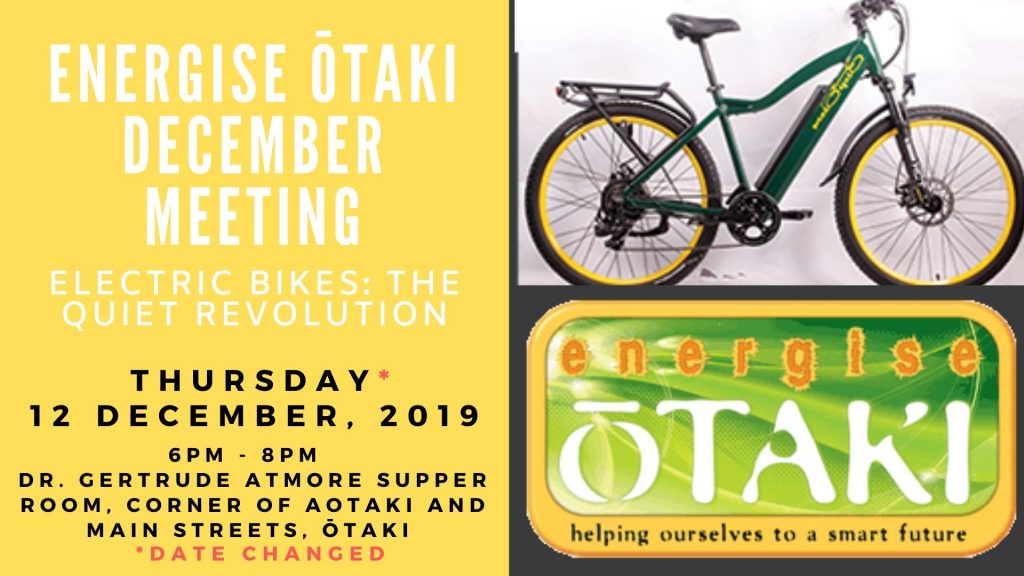
Topic: Electric Bikes: The Quiet Revolution – presented by David Rumsey of MeloYelo Ōtaki
6pm start
Dr. Gertrude Atmore Supper Room, Corner of Aotaki and Main Streets, Ōtaki
Minutes of Energise Ōtaki’s bi-monthly meeting held at the Gertrude Atmore Supper Room, 12 December 2019.
Chairman Leigh welcomed everyone to our meeting.
Attendance: Leigh Ramsey, Stuart Pritchard, Hanna Wagner-Nicholls, Lloyd Chapman, Gael Ferguson, Iain Jerrett, David Rumsey, Phil Malpas, Russell Longuet, Len Wagner-Nicholls, Nienke Itjeshorst, Terry Creighton, Max Feickert, Phil Byrne, Nick (Nga Hapu)
Apologies – Sara Velasquez, Jamie Bull, Shelly Warwick, Marilyn Stevens, Cam Butler, Hugh Bentall, Andy Fraser
Presentations
E-bikes
David Rumsey spoke about E-Bikes, the quiet Revolution. David initially bought an e-bike for his wife, who was so impressed, she took to riding 16km before breakfast, and undertaking 25km trips at weekends. He had to find out more… David met up with the charity E-volocity which is funded by sales of E-bikes via Melo Yelo. He eventually took on a dealership with them.
First David stressed what e-bikes are not. They are not a motorcycle, he stressed. They allow the user to choose the level of assistance required. When encountering a hill, you can select an appropriate level of assistance, and continue to enjoy your journey.
David bought three e-bikes along to the meeting to discuss, each with different frame styles. In the old days, “men’s” bikes had a horizontal bar that made it difficult for learners to avoid spills. Not any more. Most e-bikes are ‘step-thru’ which makes them much more user-friendly. By law, their motor cannot exceed 300 watts, which is more than enough to propel bike and rider up a steep hill, and at alarming speeds. Batteries give enough power for a decent trip, depending on the level of assistance you choose. David said he can achieve 70km ‘if you pedal a bit’, which well exceeds most people’s cycle journeys.
Cost-wise, you can spend over $14k on a sexy carbon fibre titanium bike, but David’s three models don’t exceed $3,000. One model had big fat knobbly tyres, which David says is great for off-roading, where they perform well on gravel, mud and soft sand. Great on the beach, but for paved roads not so great. On roads, ‘conventional’ tyres are better suited.
David’s e-bikes have the motor in the hub of the back wheel. This is simple, quiet and efficient. Some e-bikes have ‘mid-drive’ which is more expensive and more suited to off-road applications, where they can use the gears. Just like electric cars that have no gears, e-bikes don’t need gears either.
The Lithium-ion battery weighs around 4.5kg, and can be removed for charging, or for security. Equally, you can charge your e-bike with the battery on board. David says taking off the battery is a great dis-incentive to thieves! It takes 6-8 hours to fully charge an e-bike battery.
An e-bike weighs about 25kg. Some e-bikes ‘fold up’, meaning they’re easily transported in a car boot.
David’s MeloYelo e-bikes are pretty cool. David says they won’t turn off the rain, but they sure can cancel out a headwind! Disclosure: the writer has one. David says if you want to buy an e-bike, try several first, then decide which one best suits you. Great presentation, thanks David.
Sustainability and Resilience at KCDC.
We then welcomed Nienke Itjeshorst and Terry Creighton from KCDC to talk about projects and actions.
Nienke heads the new Sustainability & Resilience team. She’s been with KCDC for over a decade. Terry, who reports to Nienke has five years with council. The team will concern itself with Waste & Waste Minimization, energy management, infrastructure delivery to further reduce emissions and climate change action as well as emergency management, and has a strong interest in Climate Change issues, so we could see that their focus aligned well with that of Energise Ōtaki. Many of their goals were defined in a 2015 document authored by EO member Jake Roos when he was at KCDC. For those interested, it’s accessible on KCDC’s website.
The team has some bold goals, including Carbon Neutrality by 2025, and Waste minimization. Terry spoke of the CEMARS carbon audit scheme to which they belong that tracks emission and reduction since 2009. Council have achieved substantial reduction in its operational footprint, 75% in the past year, which is impressive. The aim is to achieve a 30% reduction in landfills. While numbers can deceive, a question from the audience revealed that KCDC now rank no. 2 in the country, which we should applaud.
Doubtless we’ll see more of Nienke and Terry in the future, and enjoy their collaboration.
Projects:
Gael Ferguson gave a brief overview of what’s been achieved by Energise Ōtaki in 2019.
- Solar Farm. Funding from Wellington Community Trust, lease and pricing agreement in the finals stages for signing with KCDC, tenders for supply of the farm being considered. Next step will be to finalise the delivery price and contract and to form a committee to disburse the funds that will be generated from the project.
- Main Street. We have a lease on an office, which will give us a ‘shop front’, and where we can have a physical presence, hold our meetings, and for giving energy advice. Opening February.
- Repair café. Hanna’s project was a huge success and will be repeated by popular demand in 2020.
- Bike Space/ Bike Library. Discussions are underway with KCDC to relocate to the Skate Park in Aotaki Street. The model continues to be delivering refurbished bikes bikes back to the community. Phil Byrne has joined us as our resident Bike Guru, and we congratulate him for his initiatives so far. Phil received a bottle of wine as a ‘thank you’ for his efforts.
- Ōtaki College continues to be a major focus of EO’s initiatives. Heating the college pool was a success in 2019, Evolocity, which initially encouraged college students to explore technology subjects has been an example of a project the has ‘grown up and left home’ said Gael. Next year we will develop the second Solar array at the college, and are working with them to prepare a proposal for funding for energy conservation and energy supply infrastructure via a new Ministry of Education fund.
- Nufuels
- Recent Solomon Islands visit has been a great success, with funding from the government and Caritas, Leigh and Gael have made two successful trips to train and install systems to enable waste plastic recycling into usable energy. Nice one!
- Work on the integrated waste to energy feasibility study at the Ōtaki Transfer station is underway and due for completion around February.
- Astara Technologies EV battery repurposing project is looking at how ‘end of life’ EV batteries can be effectively re-purposed, recycled or undergo materials recovery.
New Projects
- Gael spoke of a potential joint venture with the Sustainability Trust to seek funding via the government’s Healthy Homes initiative for Ōtaki.
- Discussions with Victoria University are proceeding to utilise students for intern work in Ōtaki, following on from our previous success with interns.
The future
Leigh discussed the need for Energise Ōtaki to develop enhanced Governance and Management structures to allow for the anticipated future growth.
The meeting closed at 7.40.
Next meeting: 6pm Wednesday February 12th, 2020 at Dr. Gertrude Atmore Supper Room.
